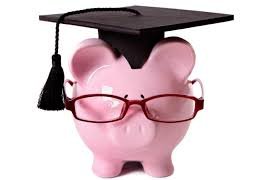Federal vs. Private Student Loans: What’s the Difference?
A large percentage of those who seek higher education require some kind of financial assistance. Among adults age 18-29, nearly 40 percent carry some level of student loan debt. When deciding who to borrow from, the two major categories are federal and private sources. Let’s take a look at how each one answers common borrower questions.
Who Funds the Loan?
If you take out a federal student loan, you borrow from the government. Private loans are funded by banks, credit unions, state agencies, schools, and other private financial institutions.
Which One Has Lower Interest Rates?
In general, federal student loans have lower interest rates. For example, Direct Subsidized and Direct Unsubsidized loans for undergraduates currently have a 4.45% interest rate. However, some federal student loans may have higher interest rates, such as Direct PLUS Loans* that come with a 7% rate. Also, the government charges an upfront fee on PLUS loans of nearly 4.3%, which can push the annual percentage rate (APR) on those loans up by nearly 1 percentage point..
The interest rates for private sources varies from lender to lender. However, competition tends to drive interest rates down.
*Direct PLUS loans are offered to graduate and professional students, and parents of undergraduate students. People typically take out these loans when they’ve maxed out other sources of federal financial aid.
What Are The Borrowing Limits?
Each school determines the federal loan types they choose to offer to their students. The school might also set limits on loan amount eligibility. Plus, your tax status influences the amount you can borrow. For example, for first-year undergraduates the loan limits are:
- $5,500 for dependent students
- $9,500 for independent students
Private lender loan limits vary from lender to lender and may also depend on your financial profile or credit score. Most private lenders will limit total borrowing to your school’s certified cost of attendance minus other financial aid received — the rule that applies to PLUS loans. .
Are Interest Rates Fixed or Variable?
Once they’re issued, rates on all federal loans, are fixed for life. Most private lenders offer a choice between fixed and variable interest rates. If you choose a fixed rate, the rate might be higher, but you don’t have to worry about rate changes during the life of the loan.
Can I Apply For Loans Online?
The Federal Student Aid website offers in-depth information on federal loans and other sources of student aid. You must fill out the Free Application for Federal Student Aid (FAFSA) to find out what aid you’re eligible for.
If you want to compare rates between multiple private lenders, your best bet is a multi-lender marketplace. After answering a few questions about yourself, a marketplace lets you see actual rates from lenders you are prequalified with. This is the fastest way to connect with many lenders at once and see actual rates based on your unique characteristics.
When Do I Have To Start Paying Off My Loan?
If you’re an undergraduate with financial need, you may qualify for a subsidized loan. This means the government pays the interest while you are in school on at least a half-time basis. You also have a grace period for up to six months after you graduate before you have to start paying off your federal student loan.
Interest on private student loans and unsubsidized federal loans starts accruing as soon as you take a loan out. Some private lenders also offer a grace period that allows yout to defer payments for up to six months after you graduate or leave school. Whether you have a private loan or an unsubsidized federal loan, interest will continue to accrue during the grace period.
Do Lenders Require a Credit Check?
To qualify for most federal student loans, no credit check is required. The only exception is Direct PLUS loans which do require a credit check, regardless of whether the the borrower is a parent or graduate student. But instead of looking at your credit score, the government simply checks to make sure you don’t have any “adverse credit history,” such as bankruptcy, foreclosure or bills in default..
All private lenders require a credit check before approving a loan. Leveraging a multi-lender marketplace, however, makes sure your credit score is not affected by the inquiry process.
Do I Need a Cosigner for the Loan?
In most cases, you don’t need a cosigner to qualify for federal student aid. Most private loans are cosigned, although each lender sets its own requirements.



